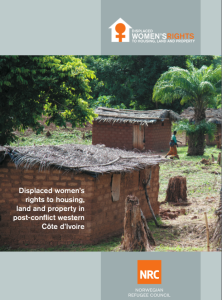Resource information
Once relatively prosperous, Côte d’Ivoire is still emerging from crisis. Two waves of armed conflict and violence – in 2002 and following presidential elections in 2010 – both led to massive population upheaval, displacing around a million people on each occasion. Subsequent conflicts have exacerbated tensions over land between autochtones, allochtones and allogènes. Women have largely borne the brunt of the country’s conflicts and its protracted displacement crises.
Improving security has allowed many internally displaced persons (IDPs) to return to their home areas since mid-2011, but more than 300,000 still live in displacement and around 38,000 refugees are still in Liberia. Most IDPs are with host families or have rented their own accommodation, but others squat or live in urban slums, where they are at risk of eviction. Nearly a quarter of the houses damaged or destroyed in 2010-2011 are still to be rebuilt. Returning IDPs and refugees often find their homes, land and plantations have been occupied or fraudulently sold in their absence. Inter-communal tensions are still high as a result and remain a major obstacle to peace building.
As in many other developing countries, women’s access to HLP is limited and often depends on their relationship with a man. Despite the fact that women are not prevented from owning land in statutory law, in practice, very few do so. As a result of the war, many women are now heading displaced households, but their right to inherit from their husbands is not recognised in customary law, which governs ninety eight per cent of land in western Côte d’Ivoire.
Most vulnerable of all are widows, divorced and abandoned women who are often forced to leave their deceased or former husband’s land or to remarry a relative or another villager in order to remain in their community and with their children.
NRC’s report Displaced women’s rights to housing, land and property in post-conflict western Côte d’Ivoire sets out the main challenges for women. The French version of the report is available here.


